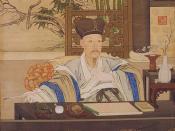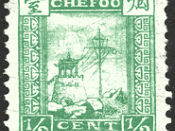The Decline of the Qing Dynasty The Manchurian Qing Empire ruled China for almost 300 years. Under Qing emperors such as Kangxi and Qianlong, China flourished in prosperity. However, the once mighty empire ended in such despair that many Chinese considered Qing's final years ridiculously humiliating. Since ancient times China has long been one of the world's strongest states, and the Chinese civilization was certainly one of the most advanced. However the situation was totally reversed as the Qing Dynasty gradually fell. The decline of Qing not only marked the end of the dynasty itself, it also indicated the cessation of China's being an admired world-leading power. The cause of Qing's decline is a complicated subject. To generalize, the decline of Qing was a result of the conflict between the population and the government, the intrusion of foreign countries, as well as internal corruption and failure of the imperial court to deal with crisis.
Historically, its own people, the native Chinese of the Han race, mostly governed China. The two exceptions are the Mongolian Yuen Dynasty and the Manchurian Qing Dynasty. The transition between Qing's predecessor Ming and Qing was a particularly difficult one, mainly due to Han people's strong resentment of a "barbarian"� government. Surrendering to the Qing was not only an abandoning of loyalty to Ming, but also a betrayal of the Han race. Even though Qing was finally able to secure it's dominance after years of effort, antagonism against the Manchurians still dwelled in the minds of the people of the generations to come. Such "anti-Manchu sentiment"� , along with the corruption and incapability of the dynasty in it's later years, helped to form rebellions which disturbed and weakened the dynasty, and eventually causing Qing to formally end in the Revolution of 1911.
The problem...


